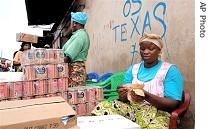2007年VOA标准英语-Micro-Loan Programs Help Poor Angolans Raise St
搜索关注在线英语听力室公众号:tingroom,领取免费英语资料大礼包。
(单词翻译)
By Scott BobbLuanda
24 July 2007
Angola's civil war ended five years ago but today the country and its people still struggle to overcome the devastation1 caused by the 27 years of conflict. At one point, 80 percent of the people lived off the informal economy and most survived on less than one dollar per day. Today civic2 groups are helping3 them raise their standard of living through small loans which help increase their income. Correspondent Scott Bobb visited micro-loan projects in an impoverished4 neighborhood of Luanda and has this report.
 |
| Angolese worker counts her money in Luanda (file photo) |
Inside his house Honorio and his workers cut and shape metal sheets and bars into pieces.
On the road in front of the house they weld the pieces together to make doors, charcoal6 cookers and brick molds which are sold on the local market.
Honorio started three years ago with a loan of $60 obtained through Development Workshop, a civic group that has been in Angola for more than two decades helping to alleviate7 poverty through grassroots projects.
The program brings people, often neighbors, together in groups of 10 to 30. It teaches them to operate a business and to save part of their earnings8. They repay the loans over three months. After that they can borrow a larger sum and expand the business.
The program works with people who are economically active. They know how to make money but their only access to capital is through loan sharks who charge up to 300 percent. Many program participants are street vendors9. Nearly two-thirds are women who often are the main family breadwinner.
Honorio repaid his first loan and took out a new credit of $1,000. With that he expanded his business and now has three employees.
He says the loan helped him a lot. Before he could not afford half the materials. But with the loan he was able to buy a cart and machines.
Up the road, Francisco Alfredo and his partners make pots and pans, plates and cups by turning flat aluminum10 plates on lathes11. lfredo started with a $150 loan and is now working with a $3,000 credit. His group produces several hundred pieces a day.
Alfredo says the business has improved his standard of living.
He says the credit helped him a lot, especially in his life and the life of his children. He has three children in school and thanks to the program he is able to pay their school fees.
Venancia Chicumbo monitors lenders for the Workshop. She helps them deal with the banking12 system and other complexities13 of the formal economy.
Chicumbo says micro-credits provide a service to poor people who don't have access to commercial banks. Potential clients are identified through a selection process. They undergo four weeks of training and then are evaluated to see if they understand the process. After that, she says, they may borrow the money.
The program has benefited 13,000 micro-borrowers like Alfredo and Honorio. More than 90 percent of them repay their loans because of the group structure. If one member defaults, the whole group suffers.
A local bank is now providing the capital. The Angolan government wants to launch a similar program nationwide.
The program manager of Development Workshop, Fabrice Beutler, says Angolan society is still devastated14 from the war.
"Angola has been through 27 years of civil war, that infrastructure15, the social system has been destroyed. Even the basic solidarity16 system has been destroyed. We with DW, we are recreating the solidarity system," he said.
Development Workshop works with community leaders in poor neighborhoods to bring running water and latrines to their communities. It also teaches people how to obtain legal title to the land they occupy.
Beutler says the Workshop likes to organize people at the community level and teach them how to solve their own problems.
"We are trying to empower them, capacitate them, train them on how to present a project, for example, how to present a budget, how to identify a need. All this needs of course training with the local leaders," he explained.
The Workshop has other programs, for example, promoting peace and good citizenship17 among young members of the political parties. And it trains local government officials on how to deliver services and then brings them together with community leaders to identify and solve their most pressing problems.
Back at Antonio's shop in Nocal, some vendors have come to buy his pans which they will sell on the streets or in local markets.
Some of these vendors also started their business using micro-loans. As a result Francisco's $150 loan has helped generate a living for dozens of people in this corner of Angola.




